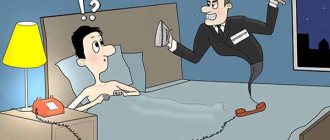What threatens the debtor in case of non-payment of debts by a court decision
And no one comes to them to describe their TV or car.
Indeed, the FSSP (Federal Bailiff Service) has enough work to run after each individual debtor, especially since finding many of them can be very difficult. But nevertheless, debts to bailiffs can bring a lot of trouble. For example, when you suddenly decide to relax somewhere on the warm Mediterranean coast, you, along with your suitcase and pleasant thoughts about your vacation, may be turned away at customs. Moreover, of course, no one will return the money to you for an unused trip, because the cancellation of the trip was your fault. This is because there is an all-Russian database of debtors, for whom restrictions are imposed on crossing the state border until the debt is fully paid. Until 2013, a ban could be imposed on a person even if his debt was 100 rubles. When is the fee not charged? The law provides for certain cases when the fee is not collected. In particular, such cases may involve situations where the claimant once again presented for execution a document for which a decision had previously been made to fine the debtor.
The borrower does not pay the loan
If the lawsuit is satisfied, the amount of debt will be collected from the guarantor. If you refuse to voluntarily execute a court decision, the bailiff service will forcibly collect the debt - for example, through an inventory and sale of property and/or withholding the amount from wages.
- together with the loan agreement (including the situation when the agreement is repaid ahead of schedule);
- when the terms of the concluded agreement are changed, to which the guarantor does not agree;
- when transferring the guarantee to another person;
- if the creditor refuses to accept the fulfillment of obligations from the guarantor;
- upon expiration of the guarantee period specified in the contract.
Settlement
Offsetting is the most convenient way to terminate mutual obligations of organizations. But this can only be done if certain conditions are met:
- Confirmation of counterclaims by two agreements.
- Homogeneity of demands (only in cash or only in kind).
- Relevance of repayment periods (the statute of limitations must not have expired).
In some cases, the use of offsets is completely prohibited:
- For child support obligations.
- For debt to the authorized capital.
- For compensation for personal injury.
- For lifelong maintenance obligations.
If all conditions are met, the offset is confirmed by drawing up a corresponding act. It may involve 2 or more parties, and each must receive its own copy of the document.
There is no approved form for the netting act, so it is drawn up in any form. The document must include:
- details of the parties indicating the full name and position of the responsible person (manager or other person authorized to sign the act);
- a list of documents on the basis of which debts arose;
- the amount of debt on both sides, as well as the amount of offset.
At the end, the act is signed by all responsible persons. Additionally, it can be certified by a seal if legal entities use it.
What are the consequences of failing to repay a loan?
Is there criminal liability for non-payment of a loan? A criminal case for non-payment of a loan is not opened, since the relationship between the bank and the borrower is regulated by the Civil Code and the Banking Law. An article for non-payment of a loan will only apply if you intentionally caused material damage to the bank.
Only if this limit is exceeded and provided that the plaintiff has all the evidence of payment evasion, the borrower can receive a term for non-payment of the loan. A debtor can be imprisoned only for fraud or for a debt over 1.5 million rubles, so do not believe collectors who claim otherwise. So, the choice of what to do if you cannot pay a loan is everyone’s personal choice. However, it must be taken into account that non-payment faces the following consequences:
Legal advice in Yekaterinburg
If all requests are returned empty, that is, with one line like “We do not have information about the debtor’s full name and property,” then the bailiff goes to the debtor’s home at the place of residence, with the intention of picking up household items. It happens that this is beneficial; the bailiff can take away a TV, tape recorder or other property; but, as you yourself understand, its cost will be minimal, and even taking into account the use and wear and tear that has taken place, and in the presence of a large debt, this is also not a panacea.
What happens if my spouse fails to pay debts on consumer loans?
Good afternoon, my husband took out several consumer loans in the amount of about 3,000,000, paid regularly until the additional income burned through, he has an official job and a salary of 40,000, when the payment is several times more on loans, 2 small children, purchased a home, 120,000 were our funds from the sale of the apartment and 700,000 were added from those taken from the bank, we registered the apartment for the children, I and he have no shares anywhere, what should we do? How to proceed? There are no funds for bankruptcy proceedings, what can be done so that at least his salary remains intact and God forbid he is not imprisoned? What could possibly be going on and what should I do next?
We recommend reading: 50% of the salary is written off according to the writ of execution regularly, but the bailiff says that penalties will be imposed
During subsequent execution, it is possible to foreclose on the property, incl. deductions from wages, foreclosure on real estate. The defendant/debtor, for his part, will have the right to ask the court either in the decision to indicate a specific method of execution (payment of the debt in installments over a certain period), or after the decision is made, to submit a request for an installment plan due to financial situation, the impossibility of payments in the manner prescribed by the contract.
The debt is listed. Is it possible to negotiate with the bailiffs?
In legal practice, debt collection is one of the most popular topics. There are a number of ways to legally reduce your debt, get a deferment, or get rid of debt altogether. Let's look at them.
- Seek legal support.
If you have nothing to pay the bailiff, first of all you need to find a good lawyer and together look for a way out of the situation. A specialist will help you understand the circumstances, suggest several options for solving the dilemma, and select and draw up the most optimal course of action.Below are the most common situations that allow the debtor to reduce the minimum payment
according to the writ of execution:
- a person lives on benefits and subsidies received from the state (in particular, the debtor is disabled, a pensioner, or low-income);
a person raises young children;
- there was a loss of job, there is no other income, but there are mandatory expenses;
- the debtor has other obligatory expenses, after paying which there is insufficient funds left for living expenses (less than the subsistence level in the region);
- the debtor was declared temporarily incapacitated.
If the client’s situation fits the criteria described above, the lawyer will help to go to court with a prepared documentary base. Based on these circumstances, you can:
- Reduce your monthly payment to pay off your debts. In other words, a person has a chance to pay off a debt of 100 rubles;
- Achieve a temporary deferment of payments. In practice, such deferments can be granted by the court for a long period: from one year to 3-5 years, the terms are determined individually.
This is where a trick comes into play: when interacting with bailiffs, the debtor records possible violations on their part. For example, an incorrectly drawn up act, lack of certain protocols, obscene language addressed to oneself, and so on.
The evidence is notarized and prepared for the complaint sent to the court. At the same time, the person submits a number of complaints and petitions to the higher authorities of the FSSP.
What does this give? Such actions allow you to temporarily lift the arrest, avoid paying debts, and gain time.
As a rule, banks and other credit organizations act as collectors. But in any case, the debtor can reach certain agreements with its creditors. You can enter into a settlement agreement to resolve the issue out of court. Further:
- the agreement is submitted to the bailiffs;
the claimant withdraws his application;
It is interesting that the method will be especially effective if another person (individual) acts as the claimant. It is necessary to find a compromise - conditions that would suit both parties.
It makes sense to start this process if the court ruling has not yet been issued or has not yet gained legal force. What will you need?
- Find a reliable person: this could be a distant aunt, another relative, or a good and trusted friend;
Find a notary you can trust;
Thus, according to your documents, you have a more serious debt. Accordingly, payment of the principal debt can be postponed until the future. The method cannot be called 100% legal, and it should not be used if:
- real creditors are very interested in repaying the debt;
- it is easy to reveal the facts of relationship;
- the relative-creditor is a poor person, and simply physically could not own the amount that you “owed”;
- the case of collecting the present debt has already been transferred to the bailiffs.
This option is not suitable for everyone, but only for people who meet certain criteria:
- do not own property that can be sold to pay off debts;
How to pay bailiffs if you don't work? The answer is simple: don’t pay and that’s it. In this case, the FSSP cannot recover income or sell property. After all necessary checks, enforcement proceedings will be closed for lack of funds for repayment.
Important!
If the debtor's financial or financial situation improves, there is a risk that the proceedings will be reopened. In practice, creditors become the initiators of the process, since bailiffs have no time to monitor the state of affairs of debtors with closed writs of execution.
Therefore, if you choose the latter option, be prepared to change your place of residence if necessary.
What fine can citizens face for non-payment of debt to bailiffs?
The size of the fee becomes especially sensitive for those who owe large amounts. Often, debtors who took out loans for 10 million rubles, if they failed to comply with the requirements of the document, were forced to add a fine of hundreds of thousands of rubles to the amount of the debt.
The fine will be 7% of the debt amount, and it cannot be less than 1 thousand rubles. Thus, if the amount of debt is small, for example, we are talking about a traffic police fine in the amount of 500 rubles, then the enforcement fee will be a minimum of 1 thousand rubles. If a citizen owes the bank 100 thousand rubles on a loan and was in no hurry to comply with the court decision, then in addition to the debt, he will be required to pay a fee of 7 thousand rubles.
What are the consequences for non-payment of the loan? Is it possible not to pay a loan, what are the consequences of this approach?
If a force majeure situation arises and you are behind on your loan payments, you should not hide from the bank. It is better to calmly talk with his representative, explain the situation and decide together how to proceed in the future. Sometimes the client can count on a short vacation. However, you should not take the deferment granted to you lightly - the amount must be paid, otherwise the bank will take extreme measures. Many debtors at first do not quite understand what non-payment of a loan is, what the consequences of such a situation are and what consequences it may cause.
Taking into account the fact that various unforeseen situations can occur in life, a certain period is provided for solving the problems that arise. Two months is enough to somehow collect the required amount. After the specified time has expired, the organization has the right to contact a collection company, and big problems await the malicious debtor. The bank takes such extreme measures only in hopeless cases. Sometimes a visit to a financial institution and a conversation with the manager can provide another additional month of deferment.
What to do if you don’t work and can’t pay: universal instructions
Based on the above, we recommend choosing the following course of action.
- Seek legal assistance from a qualified specialist.
It is better to immediately take all documents related to the case for consultation. Next, the lawyer will help you build a course of action, give recommendations and begin to take active measures. - Prepare documents and go to court.
If the debtor does not work anywhere, then documentary evidence will allow deferring payment of the debt. The court will also help you avoid paying the enforcement fee for some time. - Do not hide, do not hide property, do not hide income.
It is better to try to find a common language with the bailiff or creditor. Thus, you will be able to: either achieve a settlement agreement, or mitigate possible measures from the FSSP as much as possible.
Enforcement proceedings have been opened against you and you need advice from an experienced lawyer? Contact our experts. We will carefully consider your circumstances, give a legal assessment, and also provide legal support at all stages of collection.
What is the penalty for non-payment of the loan?
Please note that refinancing will only be available to you if you have a good credit history, i.e. no delays. If the CI is damaged by fines, delays, penalties, bankruptcy, courts, then this service will not be approved for you.
If you are ready to pay, but you are unable to do so due to the high interest and monthly payments, the smartest thing to do is to turn to a third-party company for refinancing. This service involves transferring your loan from one bank to another under more favorable conditions (reduced rate, longer debt repayment period, possible lack of insurance, etc.).
What is the penalty for non-payment of debt in court?
Sorry for the incorrect wording. I didn’t write “nonsense” about your posts, but about our legislation, which allows you to simply come and describe the property at the address where the debtor is, although he may live, I don’t know, in an apartment with relatives, in a rented apartment without registration at all. What to do then, how to protect SOMEONE ELSE’S property from seizure?
We recommend reading: Agreement with an Individual for the Production of Furniture
According to the court decision, the debtor must repay the loan with penalties - the total amount of debt is 220,000 rubles. In fact, officially: the debtor has no permanent confirmed income, no property of any kind, is not married (concluded after a court decision on collection) is registered with his mother, is ready to pay 3,000 rubles per month and no more
Non-payment of debt in Russia
Criminal liability for non-payment of debt is indeed provided for, but it is not possible to initiate a case for every unpaid loan. Firstly, the article for non-payment (177 of the Criminal Code) provides for compliance with certain conditions: the amount of debt exceeds 250,000 rubles, the case was heard in court and there is an executive decision on it, the citizen maliciously evades payments.
Then the bank will exercise its right to take away from the person what he himself owns. To do this, they go to court in a debt case. It will be difficult for any debtor not to notice that legal proceedings have begun regarding his delay. Many people decide to just forget about it and wait for a decision. But such tactics sometimes only cause harm - failure to appear in court has certain consequences.
Questionable ways to get out of debt
Below are methods that are not recommended to be used in practice. At best, they will not change the situation, and at worst, they will aggravate it.
- Employment is “outlawed”.
Many debtors, having learned about enforcement proceedings, try to switch to an unofficial place of work. But this does not solve the main problem. For example, if a person has property, at a minimum, he will be seized.You also cannot ignore alimony. Even in the absence of official work and income, alimony for the maintenance of minor children continues to be accrued. Along with them - penalties and other fees.
- Fictitious debts.
We have already described this method above. But it doesn't really solve the main problem either. Do I need to pay? Have to. Even if the court believes and accepts the documents and makes a ruling, after “paying off” the fictitious debt, you will still have to pay on real debt obligations. - Ignoring.
This is the worst tactic that can be used in interaction with bailiffs. Debtors, in particular, do not accept notices and try to avoid communication with the FSSP. Unfortunately, such actions will lead to seizure of property, collection of the maximum amount of monthly income within the limits of the law, and other stricter measures.
Changing places, hiding property, concluding fictitious transactions is also unlikely to lead to good results. Running away from responsibility for debt all your life is a bad choice.
What are the consequences of failure to pay alimony in 2020: types of liability
An appeal to the court becomes possible when an appropriate decision has previously been made on the application for payment of alimony. Submission of such an application is possible regardless of the circumstances, whether an official marriage was concluded between the parents and whether they lived together.
Occurs when an application is filed with the court and a decision is made on the case. The application indicates a request to collect arrears of alimony and penalties (penalties) for the specified period. A penalty is a punishment under civil law. It is charged for each overdue day at the rate of 0.5% of the existing debt. In addition, the debtor will have to pay a fee to the bailiffs, amounting to 7% of the amount of the debt.
What is the penalty for non-payment of alimony?
several types of punishments can be imposed on a negligent “alimony worker” . For example, in addition to the principal amount of the debt, he will pay a penalty (for each day of delay in alimony payments), a fine - if he hid his income by providing false information about his place of work and salary. He may be banned from leaving the country, and his bank accounts and property may be seized. In some cases, he may be charged with a criminal offense - malicious evasion of child support.
- One of the simplest and most effective measures to influence debtors is deprivation of the right to drive a vehicle. The law allowing the deprivation of a driver’s license for non-payment of alimony in an amount over 10,000 rubles came into force on January 15, 2020. Moreover, the bailiff has the right to make a corresponding decision without going to court - only a court decision to impose alimony obligations and the fact of alimony debt will be sufficient. Within 5 days after the decision is made, you must hand over your driver's license to the bailiff. They can be returned only after full payment of the debt and provision of a receipt.
- Not long ago, a law appeared prohibiting non-payers from traveling abroad . This restriction applies to debtors until the debt is fully repaid. They say that some airports have already installed special terminals through which you can pay the debt amount. True, even in this way it is not always possible to solve the problem, because the transfer of funds does not occur instantly. It is better to take care of the absence of debts in advance.
- For each day of delay in alimony payments, a penalty . This means that if alimony is not paid on time, the total amount of debt increases.
- A fine of up to 100 minimum wages is the punishment that threatens for non-payment of alimony if the payer hid his income.
- Corrective labor (up to 12 months) or community service (from 20 to 180 hours) are very effective punishments for persistent non-payers of alimony
- One of the most severe penalties is arrest (up to 3 months) and imprisonment (from 1 to 3 years);
- Deprivation of parental rights.
We recommend reading: A Person Must Give an Explanation If He Reported a Crime to the Police
Legal services
Interesting thing. When you pick up groceries in a store, you don’t say that you won’t pay for them on principle. So it is here. Services have been provided to you. The yard is swept, the landing is washed, hot and cold water is supplied, and there is heat. What else do you need? If you have questions for the management company, contact it, but what does the mechanics and electricians who provide you services have to do with it, and because of you they may not receive a salary. In November, Government Resolution No. 354 will come into force, and then they won’t talk to you for a long time. And you can’t hide behind children. Housing and communal services workers also have children.
Does the child have a father? Apply to the Magistrates' Court for alimony. If paternity has not been established, file a lawsuit to establish paternity and for child support. Low-income people are also given a subsidy to pay for housing and communal services; find out where in your city it is issued. Also contact RUSZN (district department of social protection), find out what regional and local benefits and payments may be available to you, or maybe you don’t know. You will have to pay anyway. If the apartment is municipal, they can move you to a dormitory
02 Mar 2020 hiurist 512
Share this post
- Related Posts
- Is it necessary to confirm the title of labor veteran in social security?
- Benefits for the Poor in the Moscow Region 2020
- How much will labor veterans in the Moscow region receive an increase from February 1
- Law for Large Families in Chita
Unpaid loans: what can happen for non-payment of loans
In addition, the consequences of non-payment of a loan may include terror from collection agencies, debiting funds from bank cards, including their freezing, and disposal of the debtor’s property in the interests of the bank.
If you decide not to pay the loan, you must have a reason not to do so. And it is correct if they are documented (dismissal, reduction in income, expensive treatment, etc.). In this case, both the bank and the court can meet halfway.
Buying debts
In order not to have to deal with the collection of overdue debt yourself, you can sell it. Debts are purchased by collection agencies. Most often, banks turn to their services, but legal entities also have the right to sell them their receivables. Such a sale incurs certain losses, since it occurs at a reduced price, but in case of a high risk of non-return, it is advisable to return at least part of the funds.
The sale of debt is an absolutely legal procedure, belonging to the category of commodity-money relations and regulated by the Civil Code of the Russian Federation. It includes the following steps:
- assessment of the debtor's solvency (carried out by collectors);
- agreement on the transaction amount;
- signing a contract;
- settlement of the transaction;
- transfer to the new owner of all debt documentation.
The amount that the agency will offer for the debt will directly depend on the level of solvency of the debtor. In the case of bad debts, there is a possibility of getting a refusal even from collectors.
What is the penalty for non-payment of microloans?
In addition to the question of what to do if they have nothing to pay microloans, MFO clients are trying to understand whether they can be imprisoned for non-payment of debt. It is important to understand here that people are not sent to prison for violating the obligations established in the agreement. However, there are situations when this is possible. This happens if the following has been done:
- The deal was concluded without corresponding registration in the state register.
- The MFO insists on repaying the debt after this right has been transferred to the collectors.
- After signing the agreement, the lender tries to change its terms.
- The agreement did not indicate the amount of interest that the borrower must pay.
Can they be held criminally liable for non-payment of a loan?
- a fine, the amount of which can reach 200,000 rubles;
- payment of the full amount of wages within 1.5 years from the date of the court’s verdict;
- assignment of compulsory work up to 480 hours;
- involvement in forced labor for up to 2 years;
- arrest for up to six months;
- imprisonment, which can reach 2 years.
It is important to understand that a borrower who regularly made loan payments before the occurrence of an unforeseen situation (job loss, bankruptcy) and was constantly looking for work after this event is not considered a fraudster. Criminal measures are not applied to such debtors. Malicious and deliberate evasion of loan obligations is not only the fact of the debt itself, but also the borrower’s reluctance to peacefully settle and resolve the issue with the bank.
Writing off debts from a bailiff and the procedure for carrying out the procedure
The transfer of obligations from one person to another (assignment) is not a reason for changing the procedure for calculating the limitation period. In exceptional situations, it is possible to extend the time for debt collection; for this, you will need to provide the arbitrator with significant evidence.
Based on a judicial act, the creditor receives the right to compulsorily collect the loan debt from individuals and organizations by contacting the bailiffs. The service provides the debtor with a period for voluntary fulfillment of the plaintiff’s demands, then a forced collection procedure is launched with recourse to wages, as well as to property.
Interesting: After the Birth of 2 Children 11,600 Rubles Whom to Pay
What is the risk for a borrower of not repaying a loan?
Thus, failure to repay the loan threatens the borrower with serious sanctions. Of course, he can change phone numbers, place of work and even place of residence and thus hide from collectors. He can also counterclaim and sue the bank, and then pay a percentage of his salary for many years. But in all these cases, the reputation of the negligent borrower will suffer. With a damaged credit history, he should no longer apply for a loan. Any bank will no longer lend him money, or will offer him a greatly inflated interest rate on the loan.
If the debt is not repaid within three months, the bank begins to act much tougher. These sanctions depend on the conditions under which the loan was taken, with or without collateral. In the first case, liability for an unpaid loan can be considered in court; the creditor files a lawsuit in court demanding the sale of the collateral. Keep in mind that in this case, the bank, having reimbursed its costs for issuing and servicing the loan, must return to the borrower the remaining amount from the sale of the property.
Debt refinancing
Another way to settle a debt is to pay it off with a newly taken loan. This procedure is called refinancing, and its benefit for the borrower is to obtain more favorable lending conditions, and for the lender in the opportunity to get rid of debt that is problematic for collection.
The issuance of a re-loan is strictly targeted, that is, it can be used exclusively to repay existing obligations. Moreover, this clause is stated in the loan agreement, and after repaying old obligations, the lender should be provided with a certificate proving the intended use of the funds.
Refinancing is advisable when there are changes in the economy, when interest rates in the banking sector are significantly reduced, and it becomes unprofitable to continue repaying the loan on the same terms. In such a situation, it is better to conclude a new agreement with the bank on market conditions and pay off the previous debt in one payment.
But this procedure also has a significant drawback, since it entails additional costs for obtaining a new loan. These costs must be taken into account when assessing the profitability of the bank’s offer.
Loan refinancing is described in this video:







